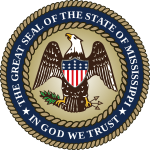| |||||||||||||||||
Mississippi's 4th congressional district | |||||||||||||||||
|---|---|---|---|---|---|---|---|---|---|---|---|---|---|---|---|---|---|
| |||||||||||||||||
 County results Dowdy: 50–60% 60–70% 70–80% Williams: 50–60% | |||||||||||||||||
| |||||||||||||||||
| Elections in Mississippi |
|---|
 |
A special election to determine the member of the United States House of Representatives for Mississippi's 4th congressional district was held on June 23, 1981, with a runoff held two weeks later on July 6. Democrat Wayne Dowdy defeated Republican Liles Williams in the runoff by 912 votes. Dowdy replaced Republican U.S. Representative Jon Hinson, who resigned from Congress following his arrest for engaging in sodomy.
Contents
- Background
- District and campaigns
- Hinson scandal and resignation
- Candidates
- Democratic Party
- Republican Party
- Independent
- General election
- First round
- Runoff election
- Aftermath
- Notes
- References
- Sources
- Further reading
Mississippi's state law requires the Governor of Mississippi to call for a special election to be held to fill any vacancies. The election date is held 40 to 60 days after the Governor has officially sent out notice. [1] All candidates run on one ballot, with a runoff election scheduled for the first- and second-place finishers if no candidate received 50% of the vote.
After Hinson's resignation, Republican Liles Williams won a primary nominating convention and faced multiple Democrats in the first round of the campaign. Williams finished in first place but failed to reach the majority vote required to avoid a runoff. He was seen as the favorite to with the election against the Democratic Mayor of McComb, Wayne Dowdy, who reached the runoff election with him. Williams ran his campaign sticking closely to President Ronald Reagan's policies – the 4th district had backed Reagan in the 1980 presidential election. Dowdy opposed the Reagan administration's tax cuts, specifically citing its cuts to Social Security and education. Another key point in the campaign was the Voting Rights Act of 1965, which Dowdy publicly supported renewing.
In an upset, Williams lost to Dowdy in a closely fought runoff election by 912 votes. Dowdy successfully put together a coalition of rural whites and African American voters. His support of the Voting Rights Act successfully mobilized African American voters in the district and was seen as being a key factor in his victory. [2]



